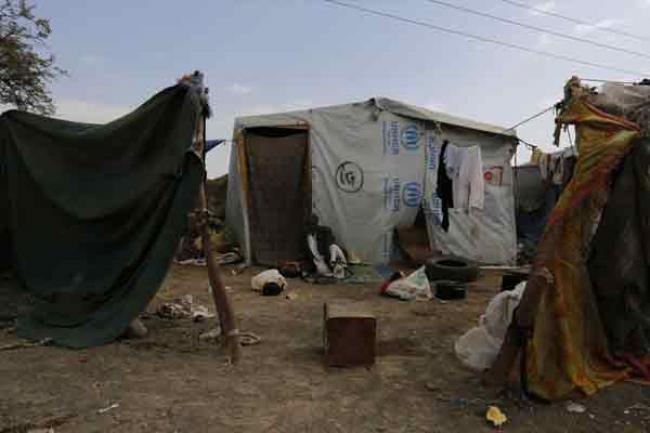Just Earth News 22 Feb 2017, 05:28 pm Print

UNHCR/Mohammed Hamoud
“It's testament to how catastrophic the situation in Yemen has become, that those displaced by the conflict are now returning home because life in the areas to which they had fled for safety is just as abysmal as in the areas from which they fled,” said Ayman Gharaibeh, the Representative for Yemen of the Office of the UN High Commissioner for Refugees (UNHCR), in a joint press release issued with the International Organization for Migration (IOM).
“These returns cannot be viewed as sustainable,” Gharaibeh added, explaining that people often return to homes that have been damaged and to areas lacking essential services, and are often forced to flee again.
A multi-sectoral location assessment report released on Tuesday, and a periodically updated population movement tracking report published last month, show that there are currently two million internally displaced people (IDPs) across Yemen and one million IDP returnees.
As conditions across the country further deteriorate, many more IDPs are contemplating a return home, where challenging security and socio-economic conditions persist. About 40 per cent of key informants indicate that IDPs now intend to return home within the next three months. The reports highlight a lack of access to income and basic services in areas of displacement as the main reasons for pushing IDPs to return to the areas of their origin.
All but one Yemen's governorates now affected by devastating conflict
Gharaibeh noted that all of Yemen's governorates, with the exception of the island of Socotra, have been affected by conflict.
“The overwhelming majority of Yemen's one million IDP returnees have returned to Aden, Amanat Al Asimah, Taizz, Lahj and Shabwah, which have been particularly impacted by hostilities and insecurity,” he explained.
Yemen's local communities are also under intense strain with alarming scarcities of food and insufficient access to water and sanitation services. Some 84 per cent of Yemen's two million IDPs have been displaced for more than a year and scarce resources are increasingly overstretched.
“IOM and all partners must scale up their response to support those newly displaced as well as those whose displacement is becoming increasingly protracted with shifting needs,” said IOM Yemen's Chief of Mission, Laurent De Boeck.
Weapons must fall silent to avert famine
In a separate statement, the Humanitarian Coordinator in Yemen, Jamie McGoldrick, warned against the impact of increased fighting along Yemen's west coast on the food crisis.
“I urgently call on all parties to the conflict and on those that have influence over the parties to facilitate the rapid entry of critical life-saving food staples into all Yemeni ports,” he said, noting that over 17 million people are frequently forced to skip meals and seven million Yeminis do not know where their next meal will come from and are ever closer to starvation.
Moreover, the availability of food in markets and the food pipeline are at imminent risk. Food shortages are widespread, food and fuel prices are rising, there are disruptions to agricultural production, and purchasing power is plummeting, especially brought about by the lack of salary payments in the public sector for over six months.
And given that the country is 80-90 per cent dependent on imported food staples, he said he is “compelled to raise the alarm,” as such factors, if left unabated, could combine to accelerate the onset of famine.
“The best means to prevent famine in Yemen is for weapons to fall silent across the country and for the parties to the conflict to return to the negotiating table,” he said.
Source: OCHA 2017 Humanitarian Response Plan for Yemen
UN agencies support nationwide polio immunization campaign
Meanwhile, a nationwide polio immunization campaign was launched yesterday in Yemen by national health authorities with support from the World Health Organization (WHO) and the UN Children's Fund (UNICEF), aiming to immunize about five million children under the age of five.
More than 40,000 health workers are taking part in the three-day campaign.
“WHO is working closely with UNICEF and health authorities to keep Yemen polio-free. The threat of virus importation is serious and this campaign aims to curb any possible return of the virus to Yemen,” said WHO Acting Representative in Yemen, Nevio Zagaria.
This is the first polio immunization campaign since April 2016. The security situation in Yemen has limited accessibility of many parts of the country, leaving many children at risk of vaccine-preventable diseases.
- IDF strikes Hezbollah targets in Lebanon after projectile fire toward Northern Israel; 31 killed
- Pakistan: Armed gunmen kidnap 14 workers during coordinated raids in Balochistan
- ISIS-inspired plot foiled in UK: Two men get life sentences for targeting Jewish community
- India rejects allegations, urges Pakistan to tackle its ‘home-grown ills’
- Massacre in Islamabad: ISIS takes responsibility for deadly Pakistan blast





-1763561110.jpg)
